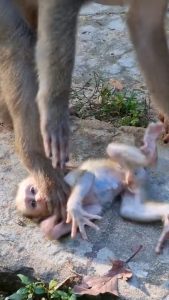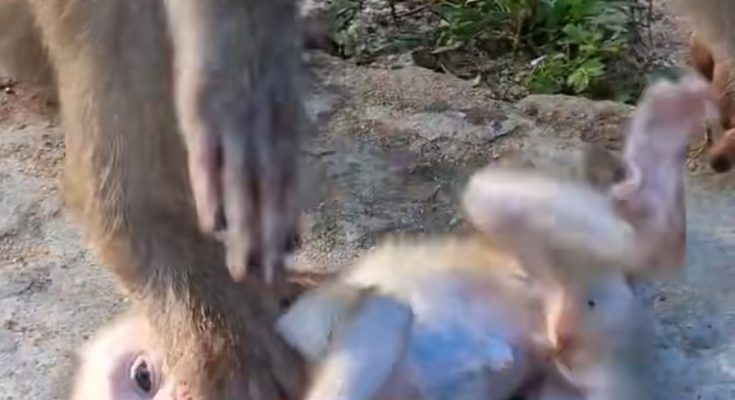 In the heart of the jungle, life moves with an ancient rhythm—birth, survival, and loss all unfold under the watchful canopy of trees. Most days, monkey mothers cradle their babies with deep affection, grooming them gently, feeding them patiently, and carrying them everywhere. But not every mother is the same. And sometimes, the bond between mother and baby breaks before it ever truly begins.
In the heart of the jungle, life moves with an ancient rhythm—birth, survival, and loss all unfold under the watchful canopy of trees. Most days, monkey mothers cradle their babies with deep affection, grooming them gently, feeding them patiently, and carrying them everywhere. But not every mother is the same. And sometimes, the bond between mother and baby breaks before it ever truly begins.
One such heartbreaking case unfolded beneath the shade of a fig tree. A female monkey had recently given birth. Her baby, a tiny and delicate newborn, with soft pink hands and a barely-there coat of fur, clung tightly to her chest. Its eyes were still adjusting to the brightness of the world, and its tiny mouth instinctively searched for milk. But the mother didn’t respond with affection. She sat cold and detached, her gaze distant, as if the small creature clinging to her didn’t belong.
She didn’t groom the baby. She didn’t look into its eyes. When the infant squeaked for milk, she turned her body away. When it cried out in fear or hunger, she remained still—expressionless, uninterested.
The other monkeys in the troop noticed, but they did not interfere. Rejection among primates is not unheard of. For humans, it might seem shocking, but in the animal kingdom, there are many reasons a mother might refuse her baby.
Perhaps the mother was too young—barely an adult herself. Sometimes, first-time mothers are overwhelmed by the birth experience. Without strong maternal instincts or support from older females, they can become confused or frightened by their new role. Instead of embracing their baby, they turn away, unable to handle the pressure of motherhood.
Or maybe the baby was born weak or sick. Nature is cruel and calculating. If a mother senses her baby is unlikely to survive—too frail, too quiet, or visibly different—she may decide not to invest her energy. In the wild, survival is everything, and resources like milk and protection are precious. A struggling infant is sometimes left behind.
There is also another possibility: trauma. This mother may have experienced previous loss or stress. If she had lost a baby before, or been separated from her troop, the emotional weight might have dulled her instincts. In her mind, mothering could now be associated with fear, confusion, or sadness. Her emotional wounds could be invisible—but deep.
Whatever the reason, the result was the same: rejection.
The baby monkey clung harder, crying softly, hoping for warmth, for attention, for love. It nestled against its mother’s chest, instinctively seeking the heartbeat it had known since the womb. But even the beating of that heart now felt distant, uncaring. At one point, the mother even stood up abruptly and shook her body, trying to rid herself of the baby’s grasp. The infant fell to the ground with a soft thud, letting out a thin, heart-wrenching squeal.
She didn’t pick it up.
She sat a short distance away, watching the trees, grooming herself instead of the crying newborn. The baby, crawling slowly on weak limbs, eventually made its way back to her and tried again—reaching for her fur, pressing its face to her belly, hoping for acceptance.
But again, she turned away.
This cycle repeated all day. The baby tried; the mother refused. The infant cried; the mother ignored. It was a slow, silent tragedy—one without screams or fights, but one just as devastating.
Love, we often assume, is automatic in motherhood. But in the wild, instinct rules over emotion. Not all mothers feel what we expect. Not all babies are loved.
As night fell and the air grew cool, the little baby monkey curled beside its mother’s side. She didn’t embrace it, but she didn’t push it away either. The baby, too tired to cry, simply lay still—waiting, hoping, needing. Maybe tomorrow she would change. Maybe she wouldn’t.
And so the jungle slept, unaware of the small heart breaking beside the one that should have loved it most.



